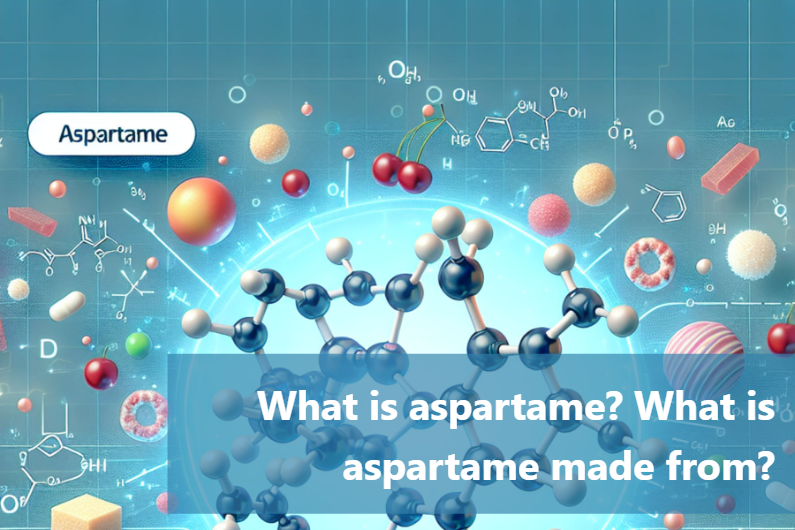Aspartame is a kind of sugar substitute that has fewer calories. It's used in lots of food and drinks. Even though it's very sweet, it doesn't add many calories, so people like to use it instead of sugar. Scientists and experts have studied aspartame a lot and they say it's safe to eat. Groups like the FDA, WHO, and EFSA have decided how much aspartame is okay to have every day, and it's much less than the amount that could cause any health problems. Aspartame's chemicals, strong sweetness, and safety record make it a popular sweetener in many products. This helps people choose what to eat and drink more wisely.
What is Aspartame Made From?
Aspartame is made from two natural substances-phenylalanine and aspartic acid. These substances are combined in a special way to create the aspartame molecule. This sweetener is much sweeter than sugar, about 200 times sweeter.
Process:
First, natural sources are used to extract the amino acids.
The extracted amino acids undergo a meticulous purification process to ensure high quality.
The purified components are then combined using advanced scientific methods to create the sweet taste of aspartame.
It's important to know that making aspartame is very regulated to make sure it's safe and consistent. Manufacturing standards are strict to make sure the sweetener is pure and safe. In the end, aspartame is made from the amino acids phenylalanine and aspartic acid, carefully combined to make a very sweet substance. The strict production methods make sure the final product is safe and high-quality, so it's used in many food and drink products.
Is Aspartame Safe to Consume?
Aspartame is one of the most extensively studied food additives and has been deemed safe for consumption by numerous regulatory agencies around the world. The U.S. Food and Drug Administration (FDA), the European Food Safety Authority (EFSA), and the World Health Organization (WHO) have all conducted thorough evaluations of aspartame and have established acceptable daily intake levels that are considered safe for the general population.
Numerous scientific studies and reviews have found no consistent evidence linking aspartame to adverse health effects when consumed within recommended limits. Nonetheless, some individuals may experience adverse reactions to aspartame, particularly those with a rare genetic disorder known as phenylketonuria (PKU).
In conclusion, based on current scientific evidence and regulatory assessments, aspartame can be considered safe for most people when consumed within the recommended levels. However, individuals with PKU or those who experience adverse reactions should exercise caution and consult with healthcare professionals before consuming products containing aspartame.
Acceptable Daily Intake of Aspartame
The acceptable daily intake of aspartame, as determined by the Food and Drug Administration (FDA) and the European Food Safety Authority (EFSA), is set at 50 milligrams per kilogram of body weight. This equates to approximately 18 to 19 cans of diet soda for an adult weighing about 150 pounds. It's important to note that the acceptable daily intake level is established with a significant margin of safety to ensure that daily consumption at or below this level is considered safe for the general population.
The Controversy Surrounding Aspartame
Aspartame has been a big topic of discussion and argument, especially about its possible impact on health. One of the most argued claims is that it might lead to cancer. Some studies have hinted at a possible connection between having aspartame and getting certain types of cancer. However, scientists have not all agreed on this topic.
On top of that, people have been worried about other possible side effects of aspartame. These include complaints of headaches, feeling dizzy, and changes in mood in some people after using products with aspartame. Although this has made the public concerned, research about this has shown mixed results, making it hard to come to clear conclusions.
It's important to know that groups that control safety, like the FDA and EFSA, have done thorough checks of how safe aspartame is and have said it's safe to use in allowed amounts. However, people are still looking into it, showing that there's still a lot of interest and worry about using aspartame in food and drinks.
Just like with anything, people's reactions to aspartame can be different, and some people might have bad effects. Knowing how well you can handle it and using it in moderation are good ideas, especially for those who might be sensitive to some things in food. Overall, all the disagreement about aspartame shows how important it is to make well-informed choices and keep looking into food safety and public health.
FAQs:
Is aspartame safe to consume?
Yes, extensive research and regulatory agencies have proven aspartame to be safe for consumption in moderate amounts.
Does aspartame cause cancer?
No, scientific studies have not found any conclusive evidence linking aspartame consumption to cancer.
Can aspartame cause headaches?
Some individuals may experience headaches as a result of consuming aspartame, but it is a rare occurrence and not a universal reaction.
Is aspartame suitable for people with diabetes?
Yes, aspartame is a low-calorie sweetener and can be used as part of a balanced diet for individuals with diabetes.
Does aspartame have any adverse effects on pregnancy?
Studies have shown that aspartame, when consumed within the acceptable daily intake levels, does not pose any significant risk to pregnant women or their unborn children.
This Blog post is an initiative by DiabeSmart, to provide accurate and Nutritionist / Doctor approved information related to Diabetes. DiabeSmart is India's first Food brand designed specifically for Diabetics, that has been clinically tested on Diabetics and Pre-Diabetics to deliver 55% - 70% lower Sugar spikes. DiabeSmart is part of Lo! Foods - India's leading brand for Everyday Functional Health foods.





